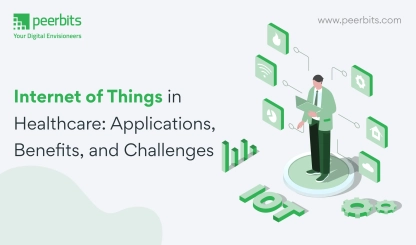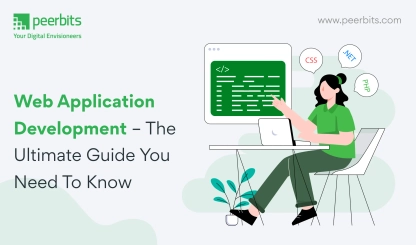Python has been the most iconic sidekick for all IT developers across the globe. Its enormous popularity amongst programming languages takes up a 29.6% market share. The Popularity of Programming Language Index, (Yes, it's a real thing!) states that Python’s fame has increased by 8.7% during the past five years. Especially, when IT giants like Google and Netflix trust a language for their dependability and security then it surely puts the nail on the awesomeness of Python!
The evolution of architecture in the software development industry has seen a massive shift towards scalability and agility. One such approach out of those has been microservices. When the trendiness of microservice architecture pairs with the awesomeness of Python, it brings out an incredible combination in the tech landscape.
However, if you haven’t explored this killer duo yet? Or, if you are planning to find a scalable architecture for your firm then this blog will be super handy for you!
In this blog, you’ll get to explore Python frameworks, their types suitable for microservice development, which business can benefit most out of Python microservices, and Key factors apart from Python that can influence microservice scalability. Let’s begin your microservice journey.
What are Python frameworks?
Python frameworks are like pre-built toolkits that help in the process of building software applications. Instead of starting from scratch, app developers can easily get a structured foundation with essential components and tools through Python frameworks. This saves time and effort of companies, allowing developers to focus on new features & updates of their applications.
The developers get free from various hectic responsibilities such as database manipulation, URL routing, and user authentication through frameworks. In such a way when you hire Python developers they only focus on the precise elements of their projects leading to a more streamlined app development lifecycle.
Why choose Python frameworks for developing scalable microservice?
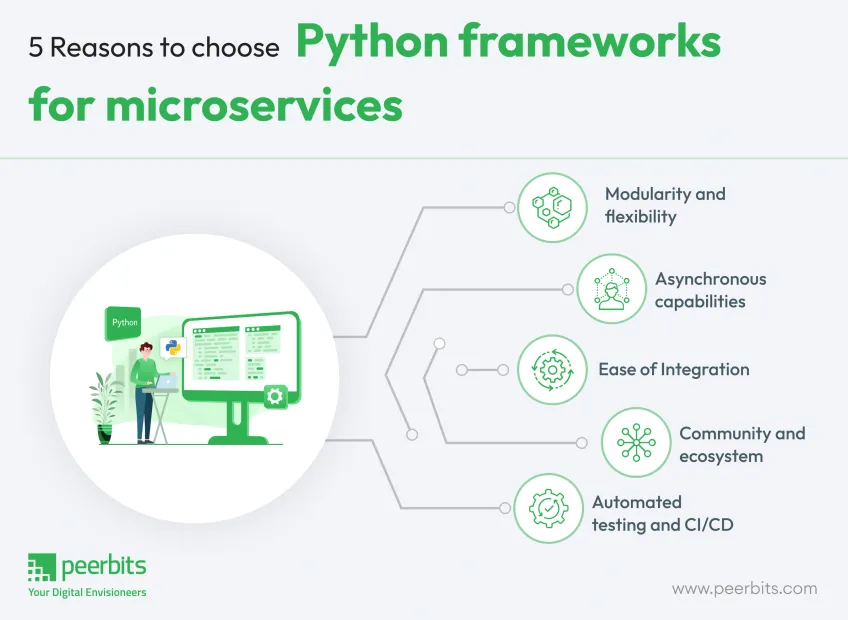
Python frameworks are highly important for the creation of scalable microservices. They provide tools and features that help specifically in empowering the modular and flexible nature of microservices architecture.
Here’s a detailed insight on Python frameworks contributing to microservices scalability:
-
Modularity and flexibility: Python frameworks like Flask and FastAPI are lightweight and modular. It helps developers to build microservices that are small, focused, and easy to manage.
-
Asynchronous capabilities: Various Python frameworks such as FastAPI and Tornado make use of asynchronous programming. This means microservices can handle multiple requests concurrently without blocking. It aids in building scalable systems that can efficiently manage high volumes of traffic.
-
Ease of integration: Python frameworks are known for their simplicity and ease of integration with other tools and services. This makes it easier to connect microservices with databases, message queues, and other components of the system.
-
Community and ecosystem: Python inherently being a classic programming language offers a wide range of libraries and extensions that can be used to add functionalities like caching, logging, and monitoring, which are essential for maintaining and scaling microservices.
-
Automated testing and CI/CD: Python’s compatibility with testing frameworks and CI/CD tools makes sure that microservices can be tested, deployed, and scaled in an automated, reliable manner.
These features make Python frameworks a powerful choice for developing microservices that are not only scalable but also maintainable, resilient, and secure.
Types of Python frameworks based on use cases
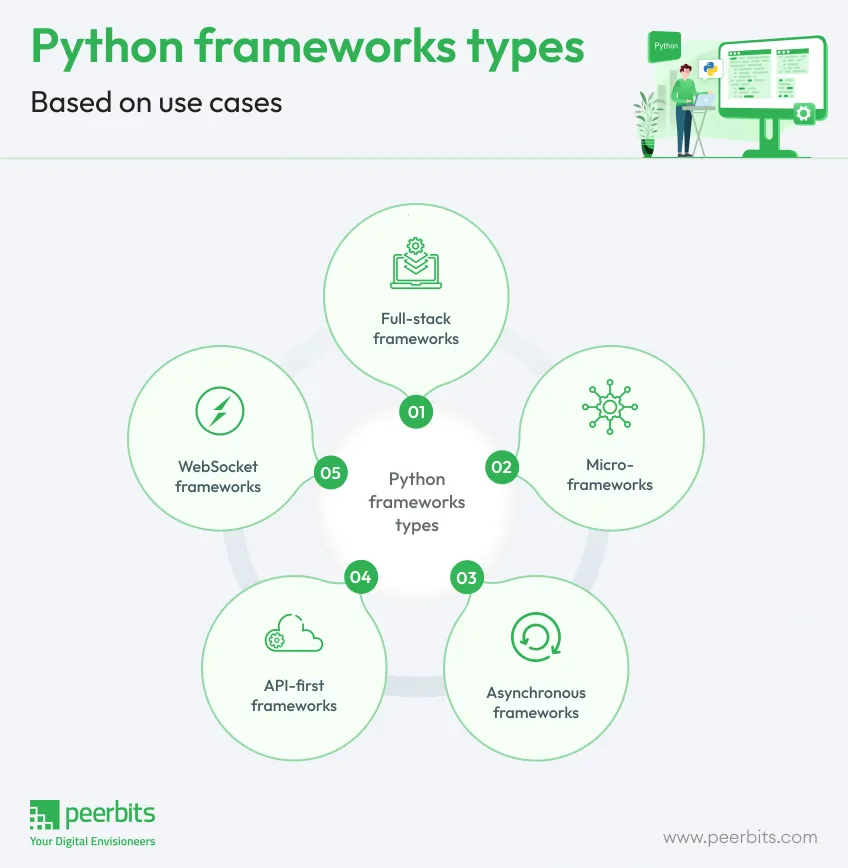
Sometimes, when people hire dedicated Python developers, they are not sure about which Python framework suits their business better. Therefore, here are 5 types of Python frameworks based on utilitie with examples that you should know:
1. Full-stack frameworks
Full-stack frameworks, as the name suggests provide a complete solution that includes everything necessary to build web applications. It offers features like- form validation, template engines, ORM (Object-Relational Mapping), and security measures.
Examples: Django, Pyramid
2. Microframeworks
Microframeworks are lightweight frameworks that provide the basic tools needed for web development. It does not enforce any particular pattern. They are proven ideal for developers who prefer flexibility and simplicity.
Examples: Flask, Bottle
3. Asynchronous frameworks
Asynchronous frameworks are designed to handle asynchronous programming( it is a technique that allows a program to run multiple tasks at once, while still being responsive to other events). It proves useful particularly for applications that require high concurrency, such as real-time applications or those dealing with a lot of I/O operations.
Examples: FastAPI, Tornado
4. API-first frameworks
API-first frameworks focus majorly on building APIs rather than traditional web applications. Their main tasks include performance and efficiency optimization in handling HTTP requests and responses.
Examples: Falcon, Hug
5. WebSocket frameworks
WebSocket frameworks provide built-in support for WebSocket protocol. It also helps in real-time, bi-directional communication between clients and servers.
Examples: Sanic, Django Channels
These frameworks cover a broad spectrum of use cases, allowing Python developers to choose the one that best fits the requirements of their application, whether it's for a full-scale web app, a simple API, or a microservice architecture-based app.
Out of these creating scalable microservices with Python is what we are going to dig further. Let’s explore some of the most popular Python frameworks that can give you a heads-up!
10 Best Python frameworks for scalable microservices
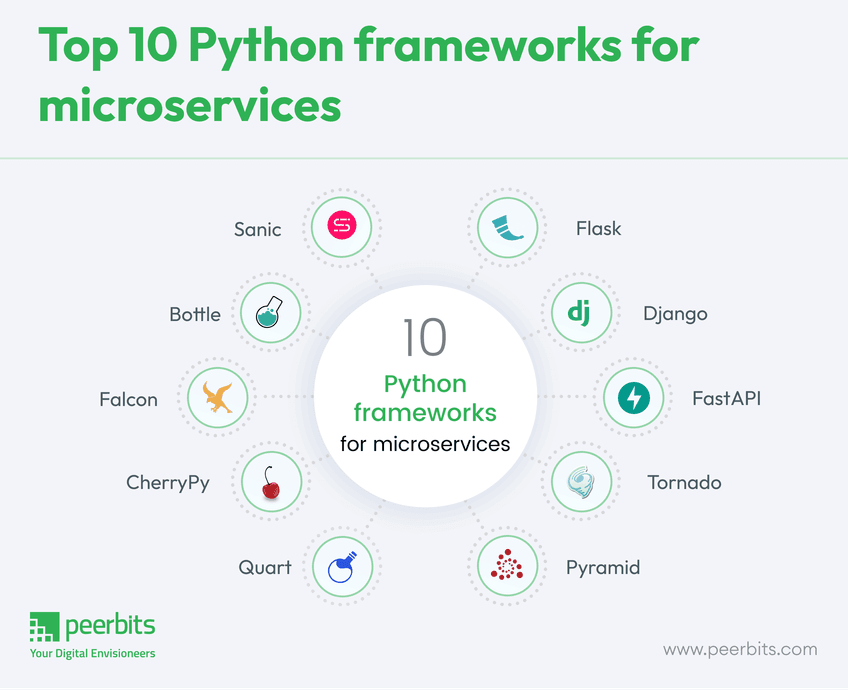
When building scalable microservices in Python, choosing the right framework is very crucial, as different frameworks suit different applications based on their use cases & features.
Here’s a detailed overview of several Python frameworks, their suitability for different application types, and their scalability potential, for your ease of understanding:
1. Flask
Flask is a lightweight and flexible micro-framework that provides developers with the essential tools to get started quickly in app development. It’s simple and does not impose particular architectural patterns, giving space for extensive customization.
-
Scalability: Flask is ideal for smaller applications and APIs, where quick development is kept on priority. However, for larger applications, developers need to integrate additional tools like Gunicorn for managing multiple requests and ensuring scalability.
-
Suitability: Flask is best suited for small to medium-sized applications where rapid development and flexibility are of prime concern. It’s also popular for building RESTful APIs.
2. Django
Django is a complete web framework that includes an ORM, authentication, admin interface, and more. Python developers looking for a framework for complex, database-driven websites can always trust this framework.
-
Scalability: Django is more heavyweight compared to other Python frameworks. Though, use of proper database optimization, caching, and horizontal scaling strategies can solve this minor hassle effectively. Though Django requires more initial setup.
-
Suitability: Django is ideal for large-scale, enterprise-level applications that require an all-in-one framework. It’s also suitable for projects where security, scalability, and rapid development are required on a larger scale.
3. FastAPI
FastAPI is a modern, high-performance web framework for building APIs, utilizing Python-type hints and asynchronous programming for speed.
-
Scalability: FastAPI’s design emphasizes performance and scalability, making it suitable for high-load applications that need to handle many concurrent requests. Its async capabilities and integration with tools like Starlette make it highly scalable for microservices.
-
Suitability: FastAPI is perfect for high-performance APIs and real-time applications where speed and scalability are necessarily needed. Modern microservices architectures are its trendiest zing!
4. Tornado
Tornado is Python’s asynchronous networking library and web framework. It is designed to handle a large number of simultaneous connections in a non-blocking manner. Many microservices applications are built with this Python framework.
-
Scalability: Tornado’s non-blocking I/O model allows it to scale to thousands of open connections. It is highly suitable for applications requiring long-lived connections.
-
Suitability: Tornado is perfectly suited for real-time applications such as chat applications or streaming services that require managing multiple connections in a single instance.

5. Pyramid
Pyramid is a general-purpose web framework known for its flexibility and modularity. It allows developers to start small and scale up as needed.
-
Scalability: Pyramid can scale well with the right architecture and third-party tools. However Pyramid needs a lot of setup and configuration in comparison to other frameworks of Python.
-
Suitability: Pyramid is best for medium to large-scale applications where flexibility and the ability to customize the framework are essential. It’s also a good choice for projects that start small but may grow in complexity over time.
6. Sanic
Sanic is a Python 3.7+ web server and web framework that’s designed for fast, asynchronous applications.
-
Scalability: Sanic’s asynchronous capabilities make it scalable for handling large volumes of concurrent requests, similar to FastAPI.
-
Suitability: Sanic is suited for real-time, high-performance APIs where low latency and high throughput are required. It’s also effective for building scalable microservices with Python framework as its backbone.
7. Bottle
Bottle is a very lightweight micro-framework, ideal for small web applications and quick prototypes. It’s a single-file framework, making it incredibly easy to use and deploy.
-
Scalability: Bottle is not designed for large-scale applications, but it can be scaled with external tools such as WSGI servers and load balancers.
-
Suitability: Bottle is best suited for small projects, prototypes, and practical purposes, where simplicity and ease of use are more important than scalability.
8. Falcon
Falcon is a minimalist web framework focused on building fast APIs. Its main power is being lightweight and performant, making it an excellent choice for high-performance applications.
-
Scalability: Falcon’s lean architecture makes it scalable for high-performance applications, but it also requires additional tools.
-
Suitability: Falcon is ideal for high-performance RESTful APIs where speed is a critical factor. It’s used in microservices applications where every millisecond counts.
9. CherryPy
CherryPy is an object-oriented web framework that allows developers to build web applications.
-
Scalability: It is known for being scaled horizontally by running multiple processes and using a load balancer.
-
Suitability: CherryPy is suitable for small to medium-sized applications where ease of use and simplicity are primarily important.
10. Quart
Quart is an ASGI framework that replicates the Flask API but supports async. It waits for handling asynchronous tasks, combining Flask’s ease of use with modern async capabilities.
-
Scalability: Quart’s asynchronous nature makes it scalable for applications that require concurrent request handling.
-
Suitability: Quart is ideal for modern web applications that need to scale while using Flask’s simplicity and API structure deploying Python microservices in production.
Benefits of Python framework for microservices
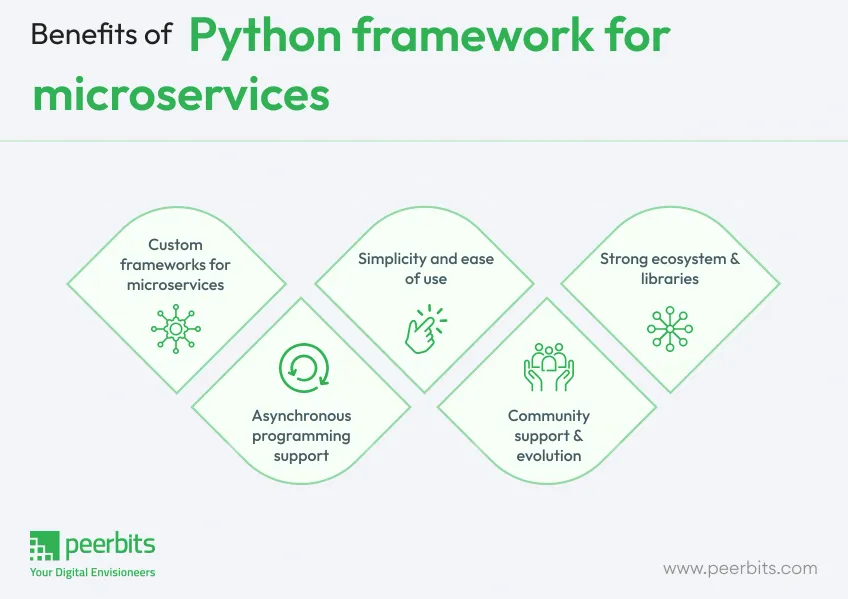
When considering frameworks for building scalable microservices, Python is preferred by many experts due to several compelling reasons. Here are 5 key benefits of Python frameworks for developing microservices that make it a prime choice:
1. Custom frameworks for microservices
Python offers a diverse set of frameworks like Flask, Django, FastAPI, and Tornado, each with unique strengths custom to different types of microservices. As stated above, FastAPI is best suited for high-performance API. You can hire Python programmers to utilize the best tool for microservices architecture, further gaining more scalability and performance in the applications.
2. Simplicity and ease of use
Python’s syntax is always clean and readable, which significantly reduces the complexity involved in writing and maintaining code. Eventually, it also yields quicker development times and easier debugging. All these add-ons from Python frameworks sync well with the core nature of microservices environments where services need to be independently developed, tested, and deployed.
3. Strong ecosystem & libraries
As everyone knows, Python possesses a vast array of libraries and tools that support microservices development. Ranging from asynchronous programming tools like asyncio to RESTful frameworks like Falcon and Flask offers developers ease of integration. Whereas a rich set of resources also reduces the need to build functionality from scratch aiding in the development timeline.
4. Asynchronous programming support
Frameworks like FastAPI and Tornado offer native support for asynchronous programming, which is highly essential for building scalable microservices. Asynchronous code helps in managing multiple operations without waiting for each task to complete sequentially. This, in turn, helps businesses acquire high concurrency, such as real-time data processing services, enhancing scalability and responsiveness in applications.
5. Community support & evolution
Python has a vibrant and active community that continually contributes to its development and improvement. Such massive support guarantees that Python frameworks meet the latest industry trends and best practices. Whereas the extensive documentation, tutorials, and forums, also make it easier for developers to resolve issues and stay updated with the latest advancements.
Also read: Async programming in Python: Build non-blocking, scalable apps
Which business can benefit from Python frameworks for microservices?
After understanding so much about Python, if you’re deploying Python microservices in production and want to explore whether your business can benefit most from this revolutionary technology? then here is a list that can help you make the final decision:
-
Tech Startups: Quickly build and iterate on services because of Python’s simplicity and microservice’s highly flexible capabilities.
-
E-commerce Platforms: High or drastic changes in traffic won’t be a hustle anymore for e-commerce businesses as microservices offer independent scaling.
-
Fintech Companies: Under the secure, compliant microservices with Python's robust security features, fintech businesses can easily flourish & upgrade with time.
-
Healthcare Providers: Healthtech apps can easily handle complex data integrations and real-time processing with efficiency through Python microservices.
-
IoT Companies: The ability of Python to manage data from diverse sources in real-time can immensely benefit IoT firms which require instantly responding systems.
Basically, all evolving sectors can take advantage of microservices architecture built with Python frameworks. Business growth isn’t that hard anymore! You just need to find the right tools and pair them with the right technologies.
Key factors affecting microservices scalability besides Python frameworks
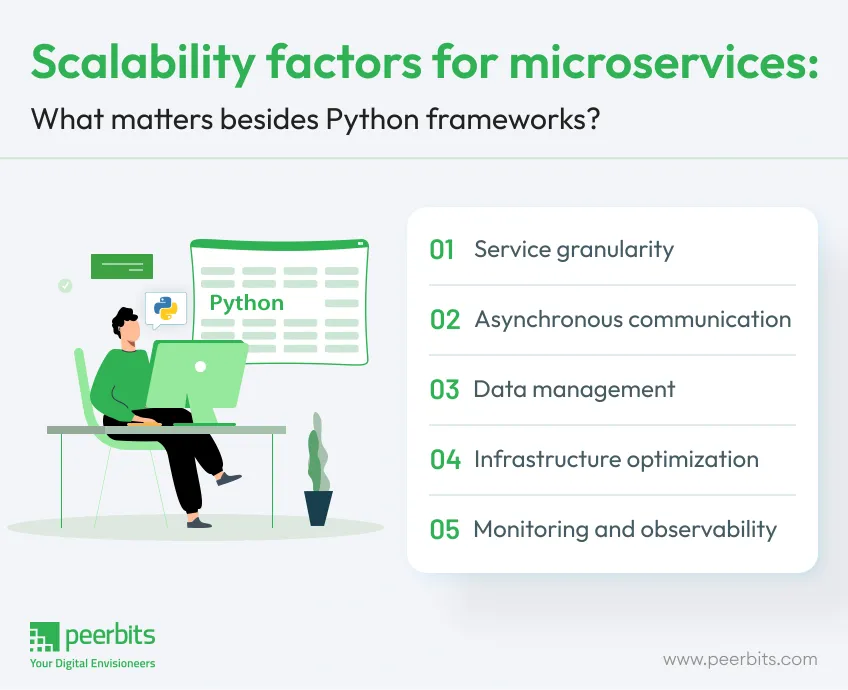
Surely, all the above information signaled that Python frameworks bring scalability to microservices. But, it's not the sole determinant. Here are a few more essential factors influencing microservices scalability apart from Python that you should keep in mind:
-
Service granularity: Microservices facilitate breaking applications into smaller independent units for more granular scaling. But when larger microservices arrive in this situation then it's quite challenging to scale independently.
-
Asynchronous communication: Using asynchronous communication patterns like message queues between microservices significantly enhances scalability by decoupling services and rooting the parallel processing.
-
Data management: Proper management of strategies is highly necessary. Especially processes like caching, distributed databases, and event sourcing, highly impact on scalability of microservices and require meticulous management.
-
Infrastructure optimization: Making use of cloud-native technologies, containerization, and serverless functions majorly influences scalability and resource utilization.
-
Monitoring and observability: Detailed monitoring and observability tools identify performance issues and optimize resource allocation leading to scalable and resilient microservices.
Conclusion
Python frameworks in combination with microservices architecture yield a simple and rich ecosystem full of asynchronous capabilities, and scalability for businesses. Whether you’re developing lightweight APIs or handling high-concurrency tasks, Python frameworks always fit in to offer you an incredible solution. Make sure you keep all the considerations of the Python framework for microservices development discussed above in line such as its suitability for applications, its utility, and sync with a variety of businesses.
Though the Python framework is a crucial factor in microservices scalability, but it is just one piece of the puzzle. Other factors, such as service granularity, architecture design, data management, and how well the services are containerized, orchestrated, and optimized, also play significant roles. Still, if you’ve got a large, complex system that can’t be easily managed then hiring Python developers holding expertise in microservices would be the correct decision. Microservices are the new future and Python frameworks are their best sidekick. Embrace the power of Python and bring the potential of scalable microservices to your business today.


